FEXOFENADINE/PSEUDOEPHEDRINE EXTENDED-RELEASE - ORAL
PHONETIC PRONUNCIATION: (fex-oh-FEN-uh-deen/sue-doh-eff-ED-rin)
COMMON BRAND NAME(S): Allegra D
GENERIC NAME(S): fexofenadine HCl/pseudoephedrine HCl
Uses
USES: This combination medication is used to temporarily relieve symptoms caused by the common cold, flu, or allergies. It contains 2 medications: fexofenadine and pseudoephedrine. Fexofenadine is an antihistamine that helps relieve watery eyes, itchy eyes/nose/throat, runny nose, and sneezing. Pseudoephedrine is a decongestant that helps relieve stuffy nose and ear congestion symptoms. This medication is not recommended for use in children under 12 years of age due to the large amount of pseudoephedrine in it.
How to use FEXOFENADINE/PSEUDOEPHEDRINE EXTENDED-RELEASE - ORAL
HOW TO USE: If you are taking the over-the-counter product to self-treat, read all directions on the product package before taking this medication. If you have any questions, consult your pharmacist. If your doctor has prescribed this medication, take it as directed. Take this medication by mouth on an empty stomach (at least 1 hour before or 2 hours after a meal). Take this medication with water. Do not take with fruit juices (such as apple, grapefruit, or orange) since they may decrease the absorption of this drug. Do not crush or chew extended-release tablets. Doing so can release all of the drug at once, increasing the risk of side effects. Also, do not split the tablets unless they have a score line and your doctor or pharmacist tells you to do so. Swallow the whole or split tablet without crushing or chewing. The dosage is based on your medical condition and response to treatment. Do not increase your dose or take this medication more often than directed. Do not take antacids containing aluminum and magnesium within 2 hours of taking this medication. These antacids can decrease the absorption of fexofenadine. Tell your doctor if your symptoms do not improve after 1 week, if they worsen, or if they occur with a fever.
Side Effects
Precautions
Interactions
Overdose
Images
Reviews
Faq for FEXOFENADINE/PSEUDOEPHEDRINE EXTENDED-RELEASE - ORAL
Fexofenadine/Pseudoephedrine extended-release combination is an antihistamine and decongestant medication. It is used to relieve symptoms such as seasonal allergies (hay fever), nasal congestion, and sinus pressure.
Fexofenadine is an antihistamine that helps relieve allergy symptoms by blocking the effects of histamine, a substance that causes allergy symptoms. Pseudoephedrine is a decongestant that works by shrinking the blood vessels in the nasal passages, thereby reducing congestion.
Common side effects may include headache, dizziness, dry mouth, nausea, upset stomach, or trouble sleeping. If you experience severe side effects such as rapid or irregular heartbeat, difficulty urinating, or hallucinations, seek immediate medical attention.
It is important to consult your healthcare provider or pharmacist before taking Fexofenadine/Pseudoephedrine extended-release with other medications, as some drug interactions may occur. In particular, avoid taking it with MAO inhibitors, certain antidepressants, or other medications that may increase blood pressure.
Follow the instructions provided by your healthcare provider or the medication label. Usually, you should take it orally with or without food, as directed. Do not crush, chew, or break the extended-release tablets. Swallow them whole. Take it at the same time each day to maintain a regular medication schedule.
It is important to inform your healthcare provider about any pre-existing medical conditions before taking this medication. Fexofenadine/Pseudoephedrine extended-release may not be suitable for individuals with heart disease, high blood pressure, glaucoma, diabetes, thyroid problems, or urinary problems. Your healthcare provider will determine if it is safe for you.
Disclaimer
IMPORTANT: HOW TO USE THIS INFORMATION: This is a summary and does NOT have all possible information about this product. This information does not assure that this product is safe, effective, or appropriate for you. This information is not individual medical advice and does not substitute for the advice of your health care professional. Always ask your health care professional for complete information about this product and your specific health needs.
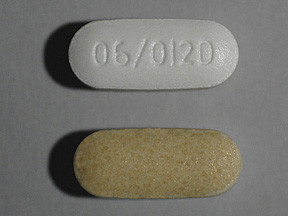
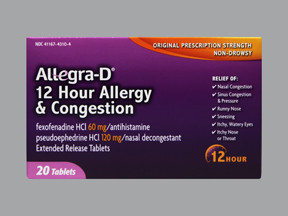
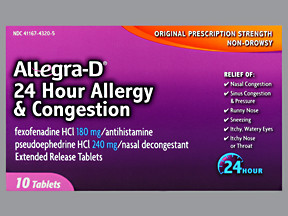

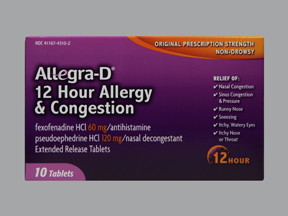
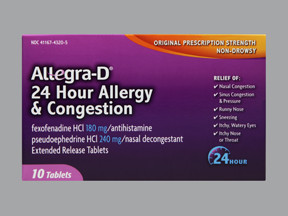
No Reviews Yet